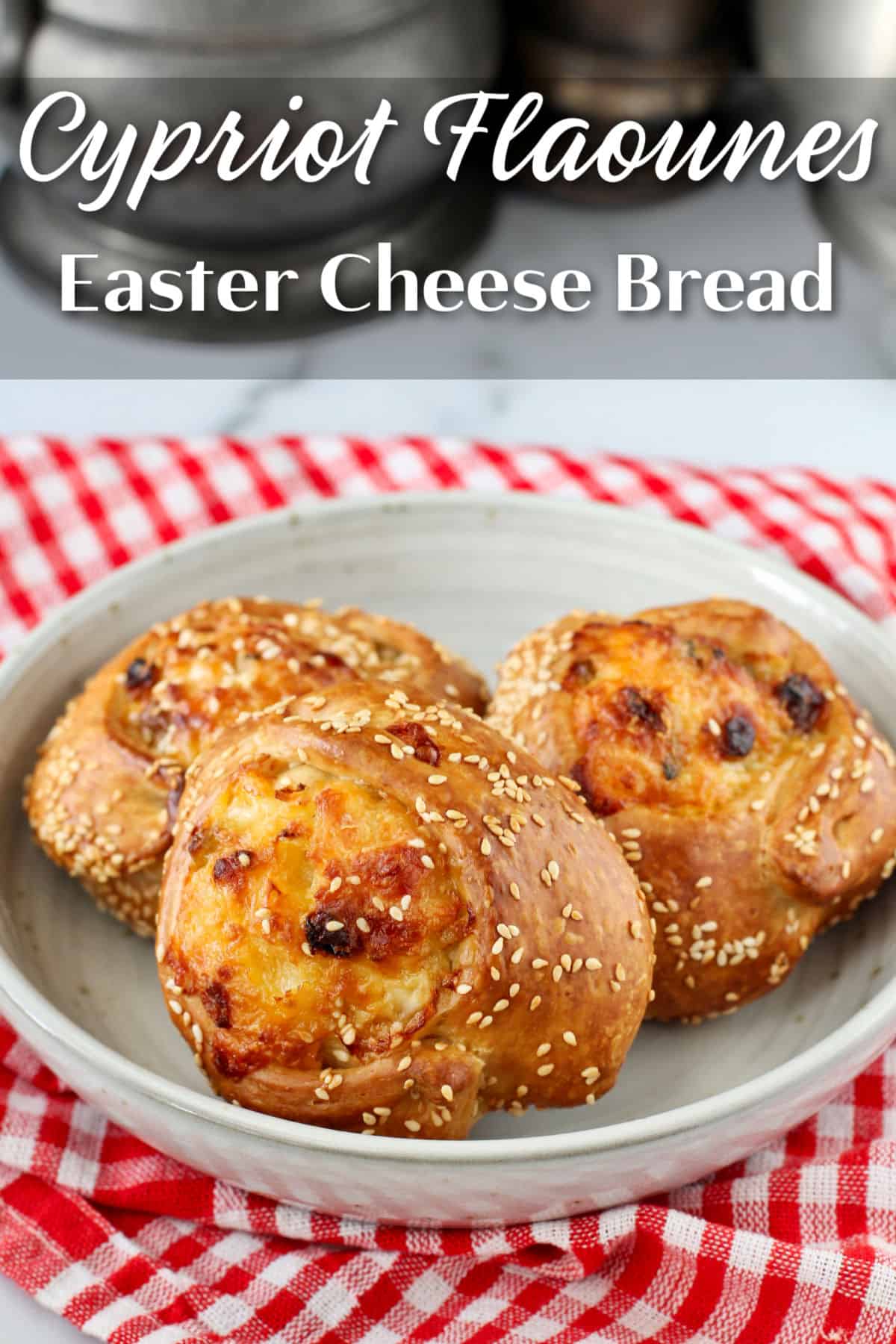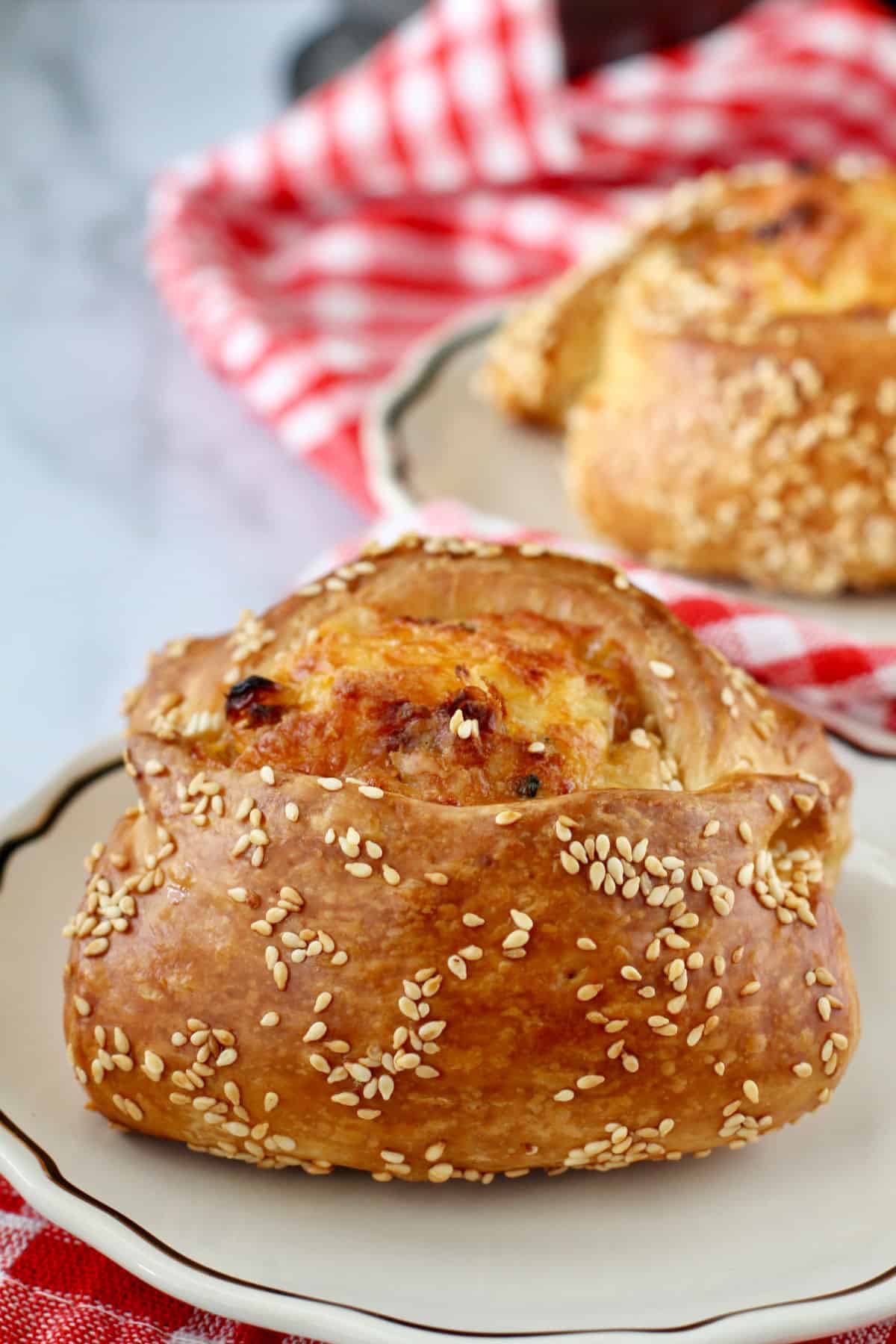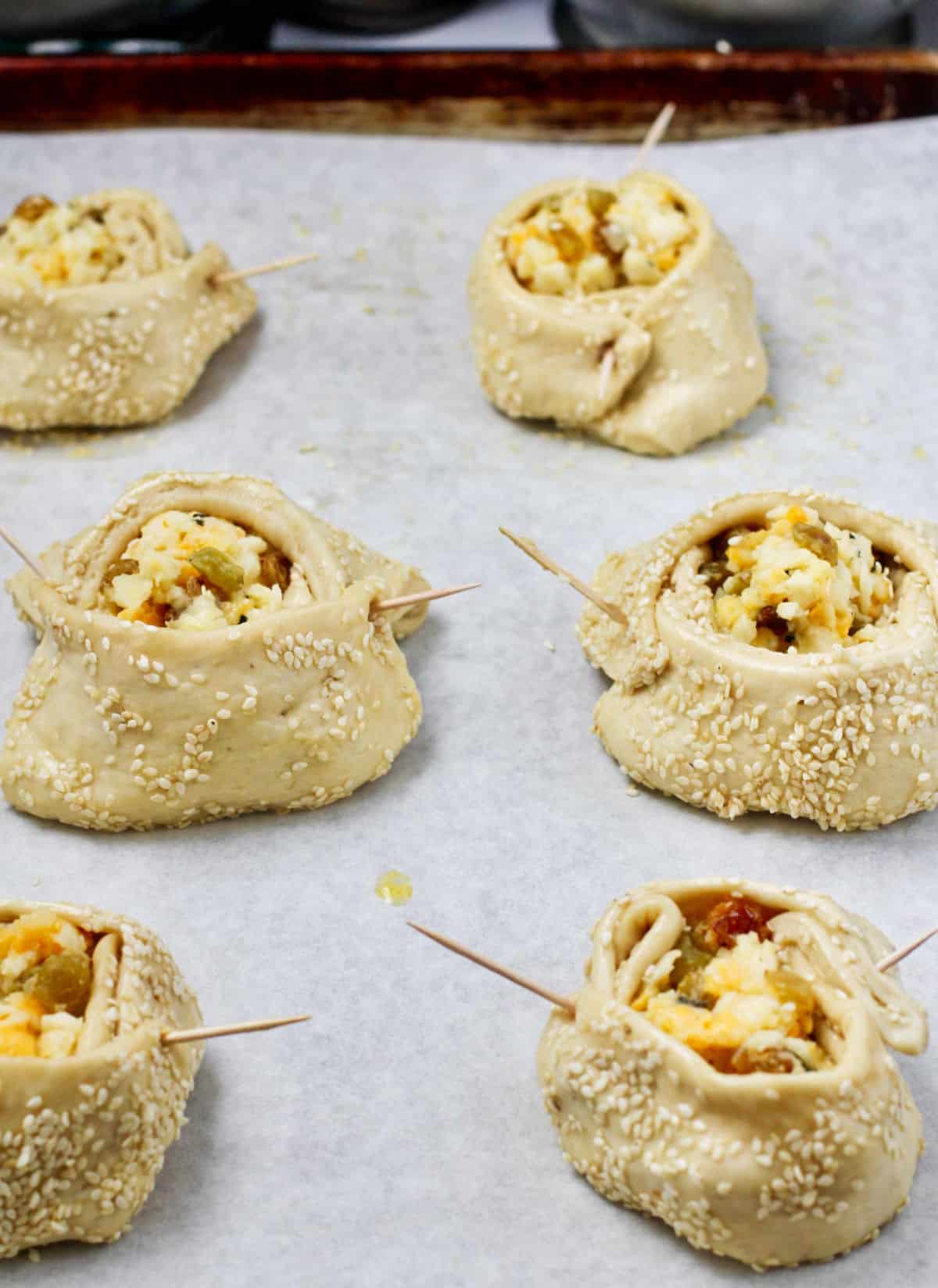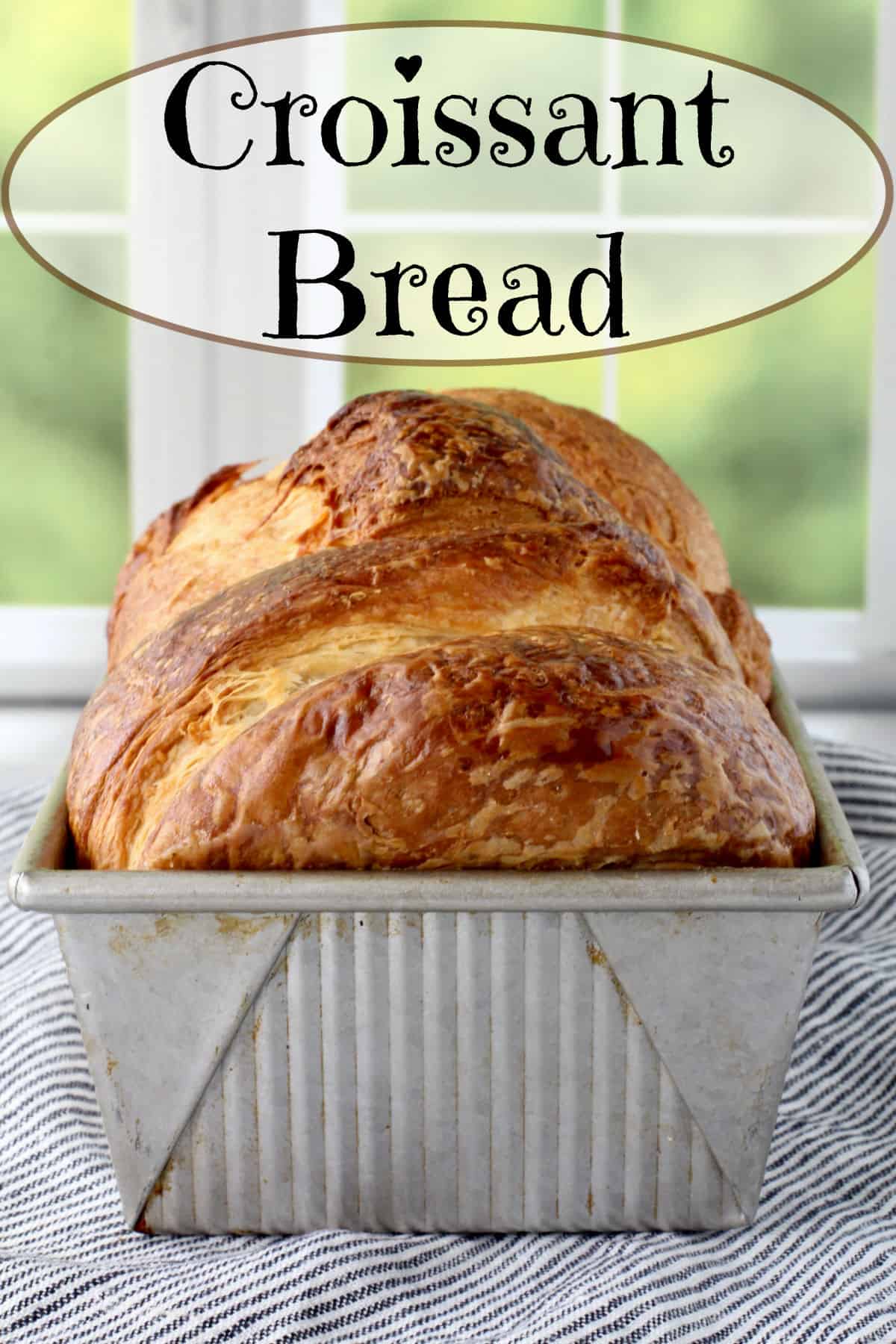Flaounes are a traditional cheese-filled pastry meant to be enjoyed for Easter after weeks of giving up dairy and eggs for Lent.
This bread originates from the Mediterranean island of Cyprus, and is flavored with some ingredients that are unique to the region, such as mahlab, mastic, and a special traditional fresh Cypriot salty goat or sheep's milk cheese called paphitiko.
Mahlab and mastic can be found in specialty Greek food stores or on Amazon. To substitute for the cheese, you can use a number of combinations of cheese, including haloumi, mild cheddar, fresh mozzarella, Romano, and even white cheese curds (which is what I used along with mild cheddar).
If you can find haloumi, that would probably be the most traditional substitute. Whatever cheeses you choose, be sure that they are hard enough to be shredded with a cheese grater. Try for a good salty and mild cheese.
Ingredient and Substitution Notes:
Mahlab (or mahleb or mahlepi) is ground St. Lucy's cherry pits. The flavor is sort of almond-y and it is very aromatic. If you can't find it, a small amount of almond extract is a good substitute. I've also used it in Assyrian Spinach Pies, Shubbak el-Habayek, and Sfoof, all breads from the same region. Be sure to keep your mahlab in the freezer.
Mastic (or masticha) is made from the sap of an evergreen tree from Cyprus. The flavor is piney yet sweet. If you can't find it, I'd probably substitute a small amount of vanilla and rosemary. Unless you are using mastic a lot, keep it in the freezer or fridge.
Both ingredients come in either ground or in larger pieces. I used pre-ground ingredients. If you buy the ingredients in a chunkier form, grind them with a mortar and pestle with a little bit of sugar.
For the cheese, I used a combination of white cheese curds and mild cheddar because I could not readily find haloumi. I could have also used fresh mozzarella but the cheese curds, which I've never seen here in Southern California before and magically appeared in my grocery store, called my name (they're really good by the way)!
Now that I can find cheese curds (for now), I'll need to try poutine!
This recipe calls for both mint and raisins. Feel free to omit them or substitute dried figs for the raisins and leave out the mint. I used golden raisins (sultanas) in this recipe as well as chopped fresh mint.
These pastries are also coated with sesame seeds (you can use black or white) on the outside.
Evidently, the making of these flaounes is quite the family production, kind of like tamale making parties here at Christmas, where all of the women get together to mix the ingredients and assemble the pastries while enjoying each others' company.
A lot of the recipes I've seen are for making dozens of these flaounes at a time (mercifully, this recipe makes just six).
There are sources that report that the flaounes are assembled and baked on Holy Thursday, Good Friday, or Holy Saturday, and then either delivered to the church or served on Easter Sunday. I've also seen sources that report that these pastries are also included in a Muslim holiday tradition on the Turkish side of the island.
Tips for Making Flaounes:
Be sure to mix the filling ingredients a day in advance. This gives the filling ingredients a chance to "meld." While this recipe includes baking powder in the filling, some recipes include yeast, symbolic for Christ rising.
Do not pack the filling tightly in the pastries. Instead, you should pack it lightly.
The dough itself should not be sticky at all, nor should it be over kneaded. You might have a bit of challenge bringing everything together because the dough isn't very wet. If you have problems mixing everything together, just wet your hands a bit with water while mixing. It will come together while rising.
Don't completely cover the cheese filling with the dough. The goal is to create a "pie" with the pastry/bread surrounding the filling.
You are supposed to use an egg wash to keep the folded sides together. I found that the folds didn't actually stick together very well, so I used toothpicks to hold everything together.
These pastries are lovely served warm and have a wonderful savory sweet flavor. You can keep them at room temperature for up to three days.
We reheated leftovers in a 325 degree F oven for about 15 minutes.
This month, the Bread Baking Babes are making Cypriot Flaounes. Our host kitchen is Kelly of A Messy Kitchen.
Kelly is a bread baker extraordinaire. Her recipes are totally trustworthy. The only change I made was to use instant yeast rather than active dry, and to skip the mastic in the dough. Plus, my mastic and mahlab were pre-ground.
After the recipe, be sure to visit the Bread Baking Babe's links for their takes on Flaounes.
Cypriot Flaounes (Easter Cheese Bread from Cyprus)

Ingredients
- 1/2 teaspoon ground mastic
- 1/2 teaspoon ground mahlab
- 1/2 teaspoon sugar
- 5 ounces white cheese curds, shredded
- 3 ounces mild cheddar cheese, shredded
- 1/2 cup (58 grams) golden raisins
- 1/4 cup (42 grams) durum or semolina flour
- 1/2 teaspoon baking powder
- 1/2 teaspoon finely chopped mint leaves
- 1 egg, lightly beaten
- 256 grams all purpose flour
- 1/2 teaspoon baking powder
- 1/4 teaspoon salt
- 1 1/8 teaspoons instant yeast
- 1/2 teaspoon ground mahleb
- 1/2 teaspoon sugar
- 1/6 cup extra virgin olive oil
- 1/2 cup plus 2 tablespoons lukewarm milk (about 100 degrees F)
- 1 egg plus 1 tablespoon water, whisked
- 1/4 to 1/2 cup sesame seeds
Instructions
- In a small bowl, mix all of the filling ingredients together until fully combined. Cover with plastic wrap and refrigerate overnight.
- Remove from the refrigerator about an hour before using.
- Mix the flour, baking powder, salt, instant yeast, ground mahleb, and sugar.
- Add the olive oil and work it into the flour mixture with your fingers.
- Add the milk and mix and knead lightly by hand until all of the dry ingredients have been incorporated. Wet your hands with water if the mixture is too dry. It should not be sticky.
- Form the dough into a ball, cover with plastic wrap, and let it rise until almost doubled, about 1 to 2 hours depending on the room temperature.
- Roll the dough out into a 10 inch by 15 inch rectangle. The dough should be about 1/8 inch thick. Cut the dough into six 5-inch by 5-inch squares.
- Whisk together the egg and water and spread the sesame seeds out onto a plate or quarter sheet pan.
- Brush each square with the egg wash and dip one side into the sesame seeds to coat the outside.
- Scoop a heaping 1/4 cup of filling into the center of each square (on the side without the sesame seeds), and fold the sides of the dough up over the filling (leaving the top of the filling showing), and press the corners together. You should have about a 3 inch by 3 inch rolls.
- Heat your oven to 375 degrees F.
- Place the shaped pastries on a parchment lined baking sheet, cover with plastic wrap, and let rise for 45 minutes or so, until puffy.
- Bake the pastries for about 30 minutes, until golden brown. Cool on a wire rack.
Nutrition Facts
Calories
480.97Fat (grams)
22.13 gSat. Fat (grams)
8.14 gCarbs (grams)
52.66 gFiber (grams)
3.24 gNet carbs
49.4 gSugar (grams)
9.52 gProtein (grams)
18.94 gSodium (milligrams)
443.16 mgCholesterol (grams)
90.44 mgInformation sources and recipe inspirations: My Greek Dish, Curious Cuisinière, and Kopiaste.









Toothpicks! What a great idea. Your filling cross section is just perfect and the color on the flaounes is gorgeous!
ReplyDeleteThank you! I've had enough experience with shaped breads not sticking together!
DeleteWhat beautiful golden flaounes! Gorgeous crumb, crust and filling!
ReplyDeleteThank you!
DeleteThose are gorgeous, Karen! The colour, the shape, and the loft. Bravissima!!
ReplyDeleteThe dough isn't very wet, eh? (Perhaps I didn't measure correctly....)
I was wondering about that! My dough wasn't sticky at all.
DeleteI just looked at my calculations (ermmm, miscalculations) again and see that I neglected to quarter the amount of milk and used the amount for half the recipe. Ooops!!!
DeleteToothpicks! Excellent idea! Some of mine didn't stick -- the ugly ones, so I will make a note on the recipe to use them. Perhaps my mastic was too old, but I couldn't get past the bitter taste. Different flavorings next time.
ReplyDeleteI'll probably do the same thing.
Delete